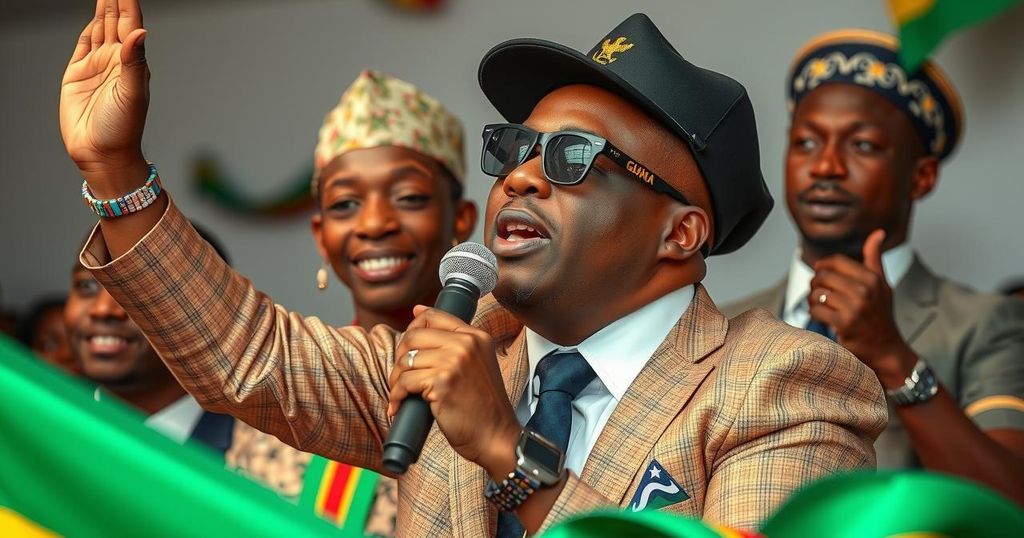John Dramani Mahama has been declared the winner of Ghana’s presidential election, receiving 56.5% of the votes. His main opponent, Vice President Mahamudu Bawumia, conceded defeat after obtaining 41%. The election reflects voter discontent with the government’s handling of the economy amidst severe cost-of-living issues. Mahama pledged to “reset” the nation economically, as his party also achieved a parliamentary majority. Celebrations erupted following the electoral outcome, highlighting a clear demand for political change.
On Monday evening, Ghana’s former leader, John Dramani Mahama, was officially declared the winner of the presidential election, a result that reflects the electorate’s displeasure with the government’s management of the economy. Having served as president from 2012 to 2017, Mr. Mahama garnered 6.3 million votes, equating to 56.5% of the votes cast, as announced by the electoral commission. His principal rival, Vice President Mahamudu Bawumia, conceded defeat after securing 4.6 million votes, or 41%.
The final voter turnout stood at 60.9 percent based on returns from 267 constituencies, and although voting is still being counted in nine areas, the electoral commissioner, Jean Mensa, assured that these results would not alter the overall outcome. Mr. Mahama, in celebrating his “emphatic” victory, pledged to “reset” the nation on various fronts, focusing on economic revitalization in light of widespread discontent among young voters grappling with the ongoing economic crisis.
Celebrations among Mr. Mahama’s supporters erupted following Mr. Bawumia’s concession, especially in the capital city, where individuals donned the opposition party’s colors and reveled in music and jubilant dances. This election occurred amid one of the most severe cost-of-living crises in decades and was perceived as a crucial test of democracy in a region fraught with challenges, including violence and political instability. The West African regional bloc, ECOWAS, characterized the election as largely peaceful, maintaining Ghana’s trend as a stable electoral environment.
Mr. Bawumia represented the ruling New Patriotic Party (NPP), which has encountered significant difficulties in addressing the economic challenges faced by citizens under outgoing President Nana Akufo-Addo’s administration. Mr. Mahama’s National Democratic Congress also secured a parliamentary majority during this election, culminating in a development similar to global trends favoring opposition parties over incumbents.
Political analysts, such as Jude Agbemava, contend that Mr. Mahama is perceived as the singular candidate capable of remedying the nation’s ailing economy. Seidu Alidu, a political science scholar, noted that the elections were ultimately a manifestation of public dissatisfaction with the ruling government, emphasizing economic concerns as central to voters’ decisions.
The recent presidential election in Ghana serves as an essential reflection of the electorate’s sentiment regarding the economic management by the ruling party. John Dramani Mahama’s victory, perceived as a response to the government’s failure to effectively handle the economic crisis, underscores the importance of public perception in democratic elections. This election further illustrates broader patterns observed globally, where opposition parties gain traction amidst increasing dissatisfaction with incumbent administrations, particularly in the context of significant economic issues impacting daily lives.
In conclusion, John Dramani Mahama’s election victory encapsulates a significant shift in Ghanaian politics, marking a rejection of current economic policies and a call for change from the electorate. With his commitment to addressing the pressing economic challenges facing the nation, Mahama’s leadership may herald a new phase for Ghana, emphasizing the power of public choice in shaping governance. The peaceful conduct of the election amidst a volatile regional backdrop reinforces Ghana’s reputation as a beacon of democracy in West Africa.
Original Source: www.clickondetroit.com






